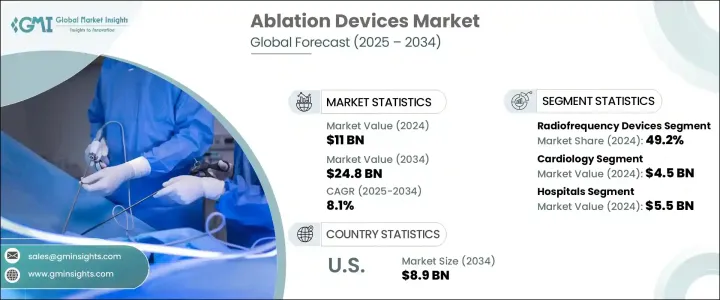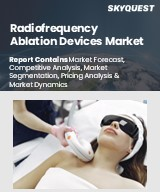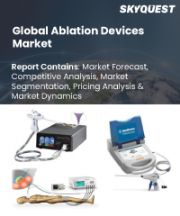
|
시장보고서
상품코드
1721575
절제 기기 시장 기회, 성장 촉진요인, 산업 동향 분석 및 예측(2025-2034년)Ablation Devices Market Opportunity, Growth Drivers, Industry Trend Analysis, and Forecast 2025 - 2034 |
||||||
세계의 절제 기기 시장 규모는 2024년 110억 달러로 평가되었고, CAGR 8.1%를 나타내 2034년에는 248억 달러에 달할 것으로 예측되고 있습니다. 병원이나 진료소는 환자에게 종래의 수술에 대신하는 보다 효율적인 선택을 제공하기 위해, 이러한 기기를 적극적으로 채용하고 있습니다.

현재 진행 중인 기술적 진보는 지지적인 규제 프레임워크과 함께, 절제 기기를 보다 이용하기 쉽고 저렴하게 하고 있습니다. 외래치료 증가나 맞춤형 의료의 추진에 의해 제품의 혁신이나 환자 마다의 치료 계획에 새로운 길이 열리고 있습니다.
| 시장 범위 | |
|---|---|
| 시작 연도 | 2024년 |
| 예측 연도 | 2025-2034년 |
| 시작 금액 | 110억 달러 |
| 예측 금액 | 248억 달러 |
| CAGR | 8.1% |
절제 기기는 집중적인 에너지 공급으로 이상 조직을 제거하거나 파괴하도록 설계된 특수 의료기기입니다. 옵션을 제공하는 데 중요한 역할을 하고 있습니다. 시장에는 고주파, 레이저/광, 초음파, 냉동 절제 등 폭넓은 기술이 있어, 각각은 임상 요구나 환자 프로파일에 기초한 독자적인 우위성을 가지고 있습니다.
고주파 기기 부문은 2024년 세계의 절제 기기 시장에서 49.2%의 압도적 점유율을 차지했으며, 앞으로도 이 리드를 유지할 것으로 예상되고 있습니다. 라디오파 소작요법(RFA)은 저침습성과 높은 치료효과로 널리 인지되어 있어 의사들 사이에서 선호되는 옵션이 되고 있습니다.
절제 기기는 순환기과, 종양과, 부인과, 비뇨기과, 안과, 미용 수술 등 다양한 의료 용도로 널리 사용되고 있습니다. 2024년에는 노인 인구의 증가와 비침습적 심장 치료에 대한 수요 증가에 힘입어 심장학 부문에서만 45억 달러의 매출을 올렸습니다. 고급 이미지 기술에 의해 지원되는 조기 진단으로 환자는 적시에 치료를 받을 수 있게 되었지만, 의사의 강한 권고로 도시와 지방 모두의 건강 관리 환경에서 치료 건수가 계속 증가하고 있습니다.
미국의 절제 기기 시장은 2034년까지 89억 달러에 달할 것으로 예측되고 있습니다.
세계의 절제 기기 업계 주요 기업은 CONMED Corporation, Medtronic, Boston Scientific Corporation, Johnson & Johnson, Smith & Nephew plc, Olympus Corporation, Biosense Webster, Inc., AngioDynamics, Inc., Abbott Laboratories, Varian Inc. 등이 있습니다. 이들 기업은 파트너십, 인수, 펄스 조사 절제 시스템과 같은 차세대 기술의 발매를 통한 전략적 성장에 주력하고 있습니다.
목차
제1장 조사 방법과 범위
제2장 주요 요약
제3장 업계 인사이트
- 생태계 분석
- 업계에 미치는 영향요인
- 성장 촉진요인
- 만성질환의 유병률 증가
- 절제 기기에 있어서 기술의 진보
- 낮은 침습 수술 수요 증가
- 고령화 인구 증가
- 업계의 잠재적 위험 및 과제
- 절제 처치에 수반하는 높은 리스크
- 엄격한 규제 승인
- 성장 촉진요인
- 성장 가능성 분석
- 규제 상황
- 기술적 상황
- 향후 시장 동향
- 갭 분석
- 특허 분석
- Porter's Five Forces 분석
- PESTEL 분석
제4장 경쟁 구도
- 서론
- 기업의 시장 점유율 분석
- 기업 매트릭스 분석
- 주요 시장 기업의 경쟁 분석
- 경쟁 포지셔닝 매트릭스
- 전략 대시보드
제5장 시장 추계·예측 : 기술별(2021-2034년)
- 주요 동향
- 무선 주파수 기기
- 레이저/광 절제
- 초음파 기기
- 냉동 절제 기기
- 기타 기술
제6장 시장 추계·예측 : 용도별(2021-2034년)
- 주요 동향
- 심장학
- 종양학
- 안과
- 부인과
- 비뇨기과
- 성형 수술
- 기타 용도
제7장 시장 추계·예측 : 최종 용도별(2021-2034년)
- 주요 동향
- 병원
- 외래수술센터(ASC)
- 기타 용도
제8장 시장 추계·예측 : 지역별(2021-2034년)
- 주요 동향
- 북미
- 미국
- 캐나다
- 유럽
- 독일
- 영국
- 프랑스
- 스페인
- 이탈리아
- 러시아
- 폴란드
- 스위스
- 네덜란드
- 아시아태평양
- 중국
- 인도
- 일본
- 호주
- 한국
- 태국
- 인도네시아
- 라틴아메리카
- 브라질
- 멕시코
- 아르헨티나
- 콜롬비아
- 칠레
- 중동 및 아프리카
- 사우디아라비아
- 남아프리카
- 아랍에미리트(UAE)
- 이스라엘
제9장 기업 프로파일
- Abbott Laboratories
- Alcon Laboratories
- Angiodynamics
- Atricure
- Bausch &Lomb
- Biotronik
- Boston Scientific
- CONMED
- Elekta
- Ethicon
- Medtronic
- Olympus
- Varian
The Global Ablation Devices Market was valued at USD 11 billion in 2024 and is estimated to grow at a CAGR of 8.1% to reach USD 24.8 billion by 2034. The demand for ablation devices continues to rise, fueled by the increasing global burden of chronic diseases like cancer and cardiovascular conditions. As healthcare systems worldwide prioritize minimally invasive solutions that deliver targeted results with faster recovery times, ablation technology has emerged as a go-to treatment method. Hospitals and clinics are actively adopting these devices to offer patients more efficient alternatives to traditional surgery. The growing awareness among patients and medical professionals about the benefits of energy-based treatments has further pushed the market forward.

Ongoing technological advancements, combined with supportive regulatory frameworks, are making ablation devices more accessible and affordable. Governments and healthcare bodies are also recognizing the role of ablation technologies in reducing hospital stays and overall treatment costs, which is accelerating their integration into mainstream care. Additionally, the rise in outpatient procedures and the push toward personalized healthcare have opened new avenues for product innovation and patient-specific treatment planning. As the demand for precision medicine increases, manufacturers are investing heavily in R&D to bring smarter, safer, and more adaptable ablation solutions to market.
| Market Scope | |
|---|---|
| Start Year | 2024 |
| Forecast Year | 2025-2034 |
| Start Value | $11 Billion |
| Forecast Value | $24.8 Billion |
| CAGR | 8.1% |
Ablation devices are specialized medical instruments designed to remove or destroy abnormal tissues through focused energy delivery. These devices play a critical role in offering precise and controlled treatment options with minimal damage to surrounding healthy tissue. The market features a broad range of technologies, including radiofrequency, laser/light, ultrasound, cryoablation, and more-each with unique advantages based on clinical needs and patient profiles.
The radiofrequency devices segment held a dominant 49.2% share of the global ablation devices market in 2024 and is expected to maintain this lead in the years ahead. This stronghold is largely attributed to the technology's growing use in treating chronic conditions like cancer and cardiac arrhythmias. Radiofrequency ablation (RFA) is widely recognized for its minimally invasive nature and high treatment efficacy, making it a preferred choice among physicians. Continued advancements in RFA technology, including more precise targeting and enhanced safety profiles, are further driving adoption.
Ablation devices are widely used in various medical applications, including cardiology, oncology, gynecology, urology, ophthalmology, and cosmetic surgery. In 2024, the cardiology segment alone generated USD 4.5 billion, driven by a rising elderly population and the growing demand for non-invasive cardiac treatments. Early diagnosis supported by advanced imaging technologies has empowered patients to pursue timely treatment, while strong physician recommendations continue to boost procedure volumes in both urban and rural healthcare settings.
The U.S. Ablation Devices Market is projected to reach USD 8.9 billion by 2034. The U.S. FDA's fast-track approval processes and favorable Medicare and private insurer reimbursement policies have significantly enhanced patient access and encouraged providers to broaden their treatment offerings.
Key players in the global ablation devices industry include CONMED Corporation, Medtronic, Boston Scientific Corporation, Johnson & Johnson, Smith & Nephew plc, Olympus Corporation, Biosense Webster, Inc., AngioDynamics, Inc., Abbott Laboratories, and Varian Medical Systems Inc. These companies are focused on strategic growth through partnerships, acquisitions, and the launch of next-gen technologies like pulsed-field ablation systems. By collaborating with research institutions and investing in advanced device development, they aim to deliver safer, more effective ablation solutions and strengthen their global footprint.
Table of Contents
Chapter 1 Methodology and Scope
- 1.1 Market scope and definitions
- 1.2 Research design
- 1.2.1 Research approach
- 1.2.2 Data collection methods
- 1.3 Base estimates and calculations
- 1.3.1 Base year calculation
- 1.3.2 Key trends for market estimation
- 1.4 Forecast model
- 1.5 Primary research and validation
- 1.5.1 Primary sources
- 1.5.2 Data mining sources
Chapter 2 Executive Summary
- 2.1 Industry 360° Synopsis
Chapter 3 Industry Insights
- 3.1 Industry ecosystem analysis
- 3.2 Industry impact forces
- 3.2.1 Growth drivers
- 3.2.1.1 Increasing prevalence of chronic diseases
- 3.2.1.2 Technological advancements in ablation devices
- 3.2.1.3 Rising demand for minimally invasive procedures
- 3.2.1.4 Growing geriatric population base
- 3.2.2 Industry pitfalls and challenges
- 3.2.2.1 High risk associated with ablation procedures
- 3.2.2.2 Stringent regulatory approvals
- 3.2.1 Growth drivers
- 3.3 Growth potential analysis
- 3.4 Regulatory landscape
- 3.5 Technological landscape
- 3.6 Future market trends
- 3.7 Gap analysis
- 3.8 Patent analysis
- 3.9 Porter’s analysis
- 3.10 PESTEL analysis
Chapter 4 Competitive Landscape, 2024
- 4.1 Introduction
- 4.2 Company market share analysis
- 4.3 Company matrix analysis
- 4.4 Competitive analysis of major market players
- 4.5 Competitive positioning matrix
- 4.6 Strategy dashboard
Chapter 5 Market Estimates and Forecast, By Technology, 2021 – 2034 ($ Mn)
- 5.1 Key trends
- 5.2 Radiofrequency devices
- 5.3 Laser/light ablation
- 5.4 Ultrasound devices
- 5.5 Cryoablation devices
- 5.6 Other technologies
Chapter 6 Market Estimates and Forecast, By Application, 2021 – 2034 ($ Mn)
- 6.1 Key trends
- 6.2 Cardiology
- 6.3 Oncology
- 6.4 Ophthalmology
- 6.5 Gynecology
- 6.6 Urology
- 6.7 Cosmetic surgery
- 6.8 Other applications
Chapter 7 Market Estimates and Forecast, By End Use, 2021 – 2034 ($ Mn)
- 7.1 Key trends
- 7.2 Hospitals
- 7.3 Ambulatory surgical centers
- 7.4 Other end use
Chapter 8 Market Estimates and Forecast, By Region, 2021 – 2034 ($ Mn)
- 8.1 Key trends
- 8.2 North America
- 8.2.1 U.S.
- 8.2.2 Canada
- 8.3 Europe
- 8.3.1 Germany
- 8.3.2 UK
- 8.3.3 France
- 8.3.4 Spain
- 8.3.5 Italy
- 8.3.6 Russia
- 8.3.7 Poland
- 8.3.8 Switzerland
- 8.3.9 Netherlands
- 8.4 Asia Pacific
- 8.4.1 China
- 8.4.2 India
- 8.4.3 Japan
- 8.4.4 Australia
- 8.4.5 South Korea
- 8.4.6 Thailand
- 8.4.7 Indonesia
- 8.5 Latin America
- 8.5.1 Brazil
- 8.5.2 Mexico
- 8.5.3 Argentina
- 8.5.4 Columbia
- 8.5.5 Chile
- 8.6 Middle East and Africa
- 8.6.1 Saudi Arabia
- 8.6.2 South Africa
- 8.6.3 UAE
- 8.6.4 Israel
Chapter 9 Company Profiles
- 9.1 Abbott Laboratories
- 9.2 Alcon Laboratories
- 9.3 Angiodynamics
- 9.4 Atricure
- 9.5 Bausch & Lomb
- 9.6 Biotronik
- 9.7 Boston Scientific
- 9.8 CONMED
- 9.9 Elekta
- 9.10 Ethicon
- 9.11 Medtronic
- 9.12 Olympus
- 9.13 Varian



















